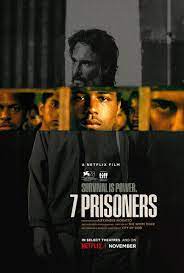
7 PRISONIEROS
Brazil, 2021, 93 minutes, Colour.
Christian Malheiros, Roderigo Santoro.
Directed by Alexandre Moratto.
Hard-hitting and challenging social drama from Brazil. It takes on issues of poor workers from the countryside tricked into coming to Sao Paolo, promise of wages, opportunities to send money back to families, but the group finding themselves trapped into hard labour in a junkyard.
The focus is on a young man, Mateus, Christian Malheiros, who leaves a loving mother and brothers and sisters, joins a group from his part of the countryside, eager, especially as they are overwhelmed by the vistas of the skyline of the city. However, joy is short lived as, immediately, they are exploited, being charged for every expense, therefore in debt to the manager of the junkyard, played by international star Roderigo Santoro.
While the film shows the detail of their hard work, punishments like being deprived of showers, a few concessions, harsh treatment from other overseers, the men bond in some ways despite difficulties and tensions. There is also a glimpse of human trafficking with young Asian women in the Brazilian city.
However, the film moves in an unexpected but also challenging direction. Luca, the boss, seems to take a shine to Mateus, inviting him to take responsibilities, even sending him outside to get food from a local canteen, relying on him more and more, eventually taking him drinking at a club, and a visit to a politician’s mansion, the politician corrupt with his dealings with the junkyard and other businesses. This causes tension amongst the other men, especially Mateus seemed to betray a close friend from the country.
The film ends with Mateus’ dilemma. Will he defy the authorities with the possibility of losing his job, and violent threats to his family back home as a means of controlling him? Or will he follow the path of Luca, becoming a supervisor, ensuring his future?
The question is for him to choose – but, with the audience identifying with him, it is also a deep question for the audience as well.
- Title? Human trafficking in labour? Labourers held prisoner in the centre of the city?
- The opening with the Brazilian countryside, the small towns, homes, families, farm work? The travel to Sao Paolo, the vastness of the city, buildings? The contrast with the work area, the confinement, the spare parts work area? The contrast with going out, the city streets, the restaurant? The politician’s home and social? The musical score?
- Mateus’s story, in the countryside, his farm working mother, his education, his sisters, the spirit of the family? The opportunity for work in the city, financial help? With his friends, travelling to the city, there amazement at the city, going to their lodgings, the workplace?
- The portrait of the four men, Mateus and his background, Samuel and his wife and mother, Ezequiel and his timidity, not being able to read, Isaque and his being on the outer? Their interactions, life together, internment, wanting to escape, the pretence of the seizure, running out the gate, been returned, the brutal treatment?
- Luca, in charge, treatment of the men, the issue of contracts, money, $20 for the meal, then the explanation of all the debts, travel, food, accommodation? Taking their phones, their identities? The continued labour, the detail, the copper wire, the metal, the various deliveries, over time, the driver and his collaboration with Luca? Attempted escape, punishment, no showers? Confinement – with no possibility of escape?
- Mateus, his leadership, supporting Samuel, the brutality towards Ezequiel and his championing him? His defying Luca? Luca singling him out, giving him responsibilities, privileges, taking him to the restaurant, in the car, eventually taking him to the politician’s party, the nightclub and the drinking and women? Keeping him away from the other men? The effect on Mateus, the operation, the phone call to his mother, the hostility of the men, Samuel burning him with the cigarette? His going out to buy them breakfast? The temptation, Luca as an example – and his explanation of his harsh upbringing, meeting his mother and her supporting her son?
- Luca taking Mateus and the men in the truck, his having to choose three, taking them to work? The women, the trafficking, taking them to the dealers, Mateus having to do the money deal? Arguing with Luca for his cut?
- The aftermath of the night out, Luca drunk, the dilemma for Mateus, the gun, whether to help the others, his hesitations, to save himself?
- The final hostility of the men, Mateus going out with Luca, survival, prosperity, Mateus and his final decisions and his future?
- An audience immersion into the world of labour trafficking, operation, money, financial corruption, political corruption? Moral dilemmas?